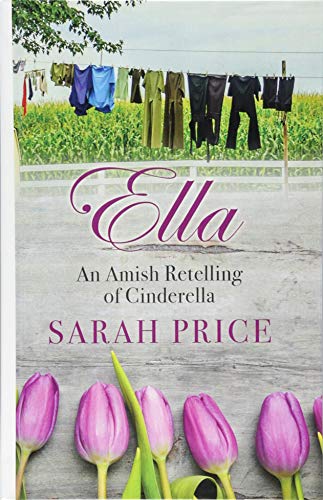
llamareads
Written on May 25, 2018
“[S]he kept repeating the words her mother had told her just before she died: Be kind and good, no matter what happens, for God has a plan for you.”
After her father died suddenly, Ella’s stepmother inherited the general store he founded and ran for years. Unfortunately, she’s proved to be not very good at it, and Ella’s stepsisters will basically do anything to get out of doing chores, preferring to go gossip with their friends.
Like I said previously, it’s a bit simplistic, especially characterization-wise. The bad people – like the stepmother and stepsisters – are very, very bad. The stepsisters, especially, abuse Ella’s tendency to put others’ needs ahead of her own to get out of doing pretty much anything so they can go gossip with friends. I didn’t like that immediately the step-sisters were described as overweight and “large boned” as a shorthand way of showing they’re the bad guys. That kind of fat shaming, in my opinion, has no place in such an unabashedly Christian book. Hannes, on the other hand, is the epitome of perfect Amish husband material – “prudent with his words and even-tempered with his speech.” The story’s version of the fairy godmother is, also, a vision of perfect Amish womanhood. I was delighted to see what the Amish equivalent to a prince was, and there were other little references to the fairy tale that were cute.
“I try to make good choices, to follow God’s Word, and to be fair to others.” With a quick glance over his shoulder, he took a deep breath and sighed. “It’s hard to watch other people who do not walk the same path.”
[…] She replied slowly, echoing his serious tone, “The choices we make, Hannes, are the one thing we truly own. If some people choose poorly, we can only pray for them, ja? We cannot be responsible for others’ poor decisions.”
My main issue with the book was that I disliked that Ella was such a doormat. Like I mentioned previously, she had a habit of volunteering to do the stepsisters’ chores so they’d stop arguing over who would do them. Her step-family is ridiculously cruel to her, basically using her a servant and running the store into the ground, but she never attempts to bring the issues up with a church authority. While Ella is, eventually, gently reproached by a church elder for being so good and kind at her own expense, it felt a bit like too much too late. I think being good and kind in the face of trying circumstances (and people!) is a certainly a good thing, but Ella took it to an extreme. In some ways, being so self-sacrificial just worsened her step-sisters’ and stepmother’s tendency towards relying on her, meaning that they never felt the effects of their wrongdoing until Ella’s “fairy godmother” stepped in. Basically, rather than allowing them the chance to correct their “sin,” she aided them in continuing it. I’m pretty sure that this is a place where general mainstream Protestantism differs with the Amish, though, so I won’t mark the book down for it.
Overall, though, I think it was a very enjoyable read, and I’m giving it four stars. If you love both Amish romances and fairy tale retellings, I’m sure you’d love this book!
I received this book for free from NetGalley in exchange for an honest review. This does not affect my opinion of the book or the content of my review.
